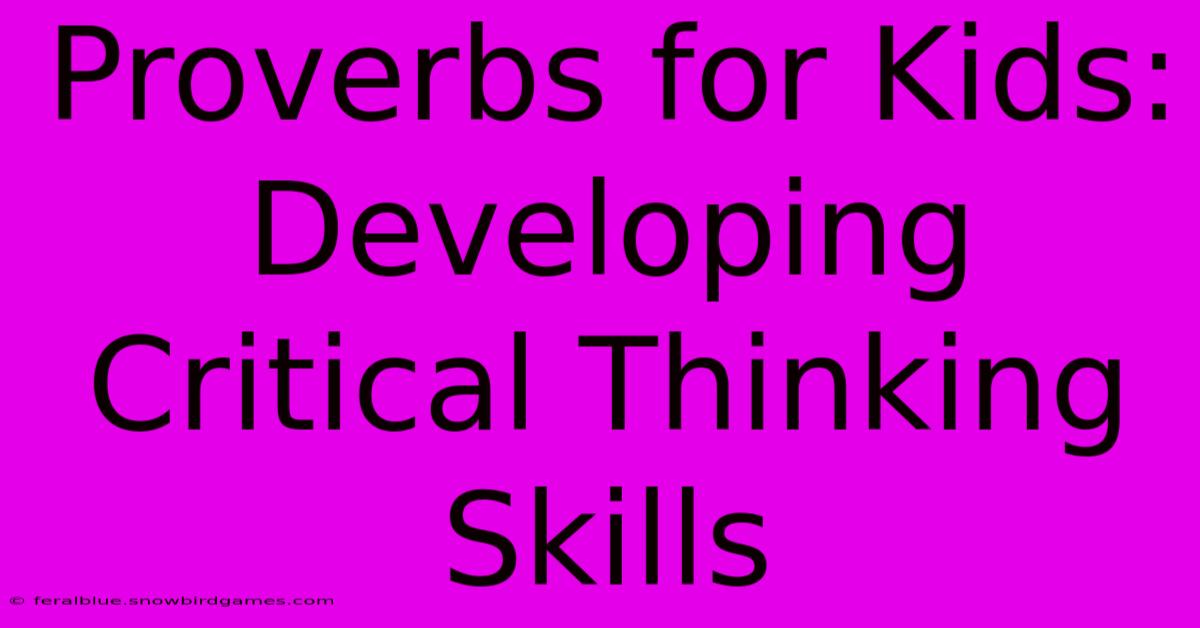Proverbs For Kids: Developing Critical Thinking Skills

Table of Contents
Proverbs for Kids: Developing Critical Thinking Skills
Proverbs, those short, pithy sayings that encapsulate wisdom, are more than just catchy phrases. They're powerful tools for developing critical thinking skills in children. By engaging with proverbs, kids learn to analyze situations, consider different perspectives, and understand the nuances of human behavior. This article explores how proverbs can be used to cultivate these crucial skills and suggests ways to incorporate them into your child's learning.
Why Proverbs Matter for Critical Thinking
Proverbs offer a unique pathway to critical thinking because they:
- Present Complex Ideas Simply: They condense intricate life lessons into memorable nuggets, making them accessible to young minds.
- Encourage Discussion and Debate: The open-ended nature of many proverbs allows for diverse interpretations and stimulating conversations.
- Promote Problem-Solving: By examining the underlying message, children can apply the wisdom to their own challenges and decision-making processes.
- Foster Moral Development: Many proverbs highlight ethical dilemmas and promote values like honesty, kindness, and perseverance.
- Enhance Language Skills: Exposure to rich vocabulary and diverse sentence structures expands a child's linguistic abilities.
Examples and Activities: Unlocking the Wisdom
Let's look at some examples and activities to illustrate how proverbs can be used effectively:
1. "A stitch in time saves nine."
- Discussion Points: What does "stitch" mean here? What does this proverb say about the importance of acting quickly to address problems? Can you think of a time when you or someone you know could have benefited from taking action sooner?
- Activity: Have your child illustrate the proverb. They can draw a picture showing a small problem that grows into a bigger one if not addressed promptly.
2. "Don't judge a book by its cover."
- Discussion Points: What does this proverb mean? Why is it important not to make assumptions based on appearances? Can you give examples of times when judging by appearances led to a mistake?
- Activity: Read a story with a character who is misunderstood based on their looks. Discuss how the character's true nature contrasts with initial perceptions.
3. "Look before you leap."
- Discussion Points: What are the consequences of acting without thinking? Can you think of situations where careful planning is important? How can you make sure you "look" before you "leap"?
- Activity: Play a game that requires planning and strategy, such as chess or checkers. Discuss the importance of foresight and careful decision-making.
4. "Actions speak louder than words."
- Discussion Points: What does this mean? Are there situations where actions are more important than words? Can you think of examples?
- Activity: Discuss the importance of honesty and integrity. How can actions demonstrate these qualities?
5. "Where there's a will, there's a way."
- Discussion Points: What does this proverb say about perseverance and determination? Can you recall a time when you achieved something difficult through hard work?
- Activity: Set a small, achievable goal for your child and encourage them to persist until they reach it. Celebrate their accomplishment.
Incorporating Proverbs into Daily Life
Proverbs don't have to be a formal lesson. Weave them into your daily conversations. Use them to explain situations, teach life lessons, and encourage thoughtful reflection. Here are a few tips:
- Start young: Even toddlers can grasp the basic meaning of simple proverbs.
- Use visual aids: Pictures, stories, and games can enhance understanding.
- Make it interactive: Encourage your child to share their own interpretations and experiences.
- Keep it fun: Learning should be engaging and enjoyable.
By incorporating proverbs into your child's life, you're not just teaching them words; you're equipping them with a valuable tool for critical thinking, problem-solving, and navigating the complexities of the world. This is a gift that will continue to benefit them throughout their lives. So start today, and watch as these timeless sayings unlock the wisdom within your child.

Thank you for visiting our website wich cover about Proverbs For Kids: Developing Critical Thinking Skills. We hope the information provided has been useful to you. Feel free to contact us if you have any questions or need further assistance. See you next time and dont miss to bookmark.
Featured Posts
-
The Hana Shafa Age Debate Whats The Real Story
Apr 03, 2025
-
Marvel Contest Of Champions Upgrade Your Champions
Apr 03, 2025
-
Sanjay Bangars Son His Passion His Purpose
Apr 03, 2025
-
Jocelyn Nungaray Moms Guide To Outdoor Adventures
Apr 03, 2025
-
Is Aj Worth Wiki Worth Your Time Find Out Now
Apr 03, 2025
